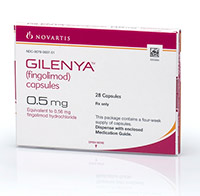Warnings & Recalls for Gilenya
FDA Warnings and Gilenya
In
December of 2011, U.S. Food and Drug Administration released information about a rare incident in which a patient died 24 hours after taking the initial dose of Gilenya. The FDA warns patients that this medicine can
slow the heart rate to dangerous levels and should be used with caution. The FDA recommends that patients be carefully monitored after taking Gilenya.
Gilenya and Pregnancy
Gilenya is listed as an FDA
pregnancy Category C medicine. The effect of Gilenya on the fetus when taken by a pregnant woman is not certain. Gilenya may cause harm to a baby that is nursing.
Do not breastfeed if you are taing Gilenya. Ask your doctor about the risks and benefits before taking Gilenya if you are
pregnant or
planning to become pregnant.
General Warnings
Gilenya is not safe for all patients. Gilenya
should not be used by anyone with the following conditions:
- is allergic to fingolimod
- extreme heart failure (the heart is not able to pump blood properly)
- "AV block" (impairment between the atria and ventricles)
- sick sinus syndrome and does not have a pacemaker
- if you use any medications for maintaining your heart rate
- if you have had a recent heart problem such as a heart attack, any type of stroke, or pain in the chest
Tell your doctor about
all medical conditions you may have or if you are taking
any medicines. Let your doctor know if you have:
- any illnesses or infections
- heart disorders
- heart rate or blood pressure irregularities (including high or low blood pressure)
- diabetes
- any liver or kidney problems
- breathing disorders
- uveitis (swelling of the eye)
- never had chickenpox or have never been given a varicella vaccination
While taking Gilenya, keep all appointments with your doctor, you may need to have your blood, eyes, liver and lung function tested to ensure your safety.
Gilenya Interactions
Gilenya may
interact with other drugs or affect the way other medicines work. Let your doctor know about
all medications you are taking, especially:
- beta blockers
- calcium channel blockers
- arsenic trioxide or chemotherapy medicines
- transplant rejection preventing drugs such as tacroliuus
- antibiotics, antifungals and anti-malaria drugs
- antidepressant or medicines for mental illnesses
- nausea preventing medication
- narcotics
- pain relievers
- any medicine which may decrease the ability of the immune system
- migraine headache treatments
Gilenya Treatment and Use
Gilenya | fingolimod is a sphingosine l-phosphate receptor modulator medicine marketed by Novartis for treating and preventing relapsing (deteriorating) multiple sclerosis. Gilenya was approved by the U.S. Food and Drug Administration in September of 2010 and has become a controversial medicine for the serious risks it poses. Gilenya does not cure multiple sclerosis.
Gilenya should only be used in patients over the age of 18.
How Does Gilenya Work?
Multiple sclerosis is caused by abnormally functioning nerve cells. Gilenya treats multiple sclerosis and prevents serious damage to the body by suppressing the immune system and blocking cells from causing further injury to nerves.
How to Use Gilenya
Gilenya is prescribed in capsule form to be taken orally. It is typically recommended to take Gilenya in .5mg doses once each day with a full glass of water, with or without food. Your first dose should be taken under supervision or in a doctor’s office to monitor the effects for 6 hours after taing Gilenya.
Use Gilenya as prescribed by your doctor. Do not use any different dosage amounts.
 decrease in heart rate
decrease in heart rate